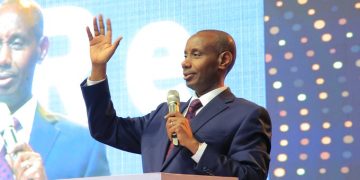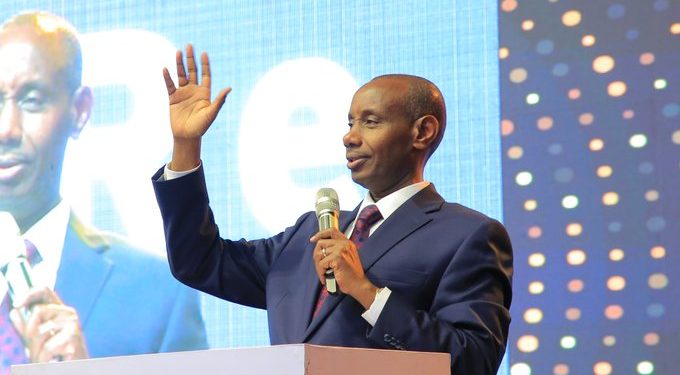Uganda Christian University (UCU) Vice Chancellor Prof. Aaron Mushengyezi has urged Ugandan institutions to embrace resilience, innovation, and purpose as foundations for sustainability, noting that “building resilient institutions is not just a passion—it is a responsibility.”
Delivering keynote remarks as Chief Guest at the 15th Financial Reporting (FiRe) Awards, held under the theme “Sustainability Practices and Reporting in Uncertain Global Times,” Prof. Mushengyezi shared practical insights on institutional transformation and leadership. Drawing from his experience leading UCU and founding the Franciscan Investment Cooperative, he outlined four guiding principles for resilience and growth:
“First, consistency in mission and vision — stay true to your purpose through regular self-assessment,” he said. “Second, strategic resource allocation — spend only where it serves your mission. Third, ensure that systems serve people, not the other way around. And finally, embrace a ‘business unusual’ mindset — question outdated practices and adapt boldly.”
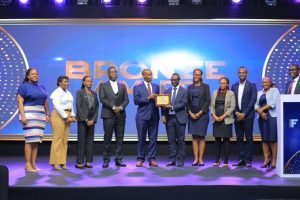
Prof. Mushengyezi reflected on how UCU used the COVID-19 pandemic as an opportunity to reinvent itself. “Resilience is not about clinging to old ways,” he said. “It’s about adapting, optimising, and investing in what truly matters. At UCU, we cut costs, reduced bureaucracy, and reinvested in our people and infrastructure. Today, we are leaner, stronger, and self-sustaining.”
He challenged both public and private institutions to think beyond survival and focus on building systems that endure economic shocks and technological disruption. “Institutional resilience is built on courage, focus, and purpose. It means aligning every policy, every shilling, and every decision to your mission,” he emphasised.
ICPAU Champions Sustainability and Global Standards
CPA Timothy Ediomu, President of the Institute of Certified Public Accountants of Uganda (ICPAU), highlighted the transformative role of sustainability and transparency in modern corporate reporting.
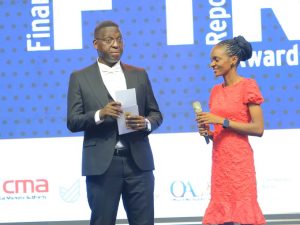
“Sustainability is about creating long-term value — balancing profitability with purpose, innovation with inclusion, and growth with environmental stewardship,” he said.
Ediomu also announced a landmark development: Uganda’s adoption of the IFRS Sustainability Disclosure Standards (IFRS S1 & S2), which will guide consistent and comparable sustainability and climate-related reporting. “Early adoption begins in January 2026, with mandatory implementation in 2028,” he revealed. “These standards will help institutions communicate their risks, opportunities, and performance more effectively.”
He commended regulators such as the Capital Markets Authority (CMA) and the Bank of Uganda for aligning their frameworks with Uganda’s sustainability roadmap, urging all institutions to “raise the bar, tell their stories truthfully, and uphold integrity.”

Sustainability as an Investment Imperative
Representing the Capital Markets Authority, Mr Kizito Denis, Director for Market Supervision, reaffirmed CMA’s commitment to integrating Environmental, Social, and Governance (ESG) principles into Uganda’s financial systems.
“Sustainability is no longer just a moral obligation but an investment imperative,” Kizito said. “We continue to encourage listed companies to adopt integrated reporting that captures both financial and non-financial performance.”
He added that aligning Uganda’s markets with international ESG standards is vital to building investor confidence and achieving long-term socio-economic transformation.
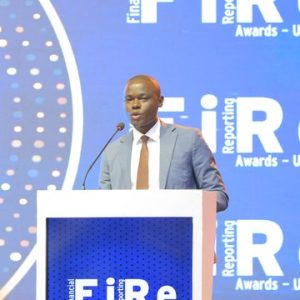
Uganda Securities Exchange (USE) CEO Mr Paul Bwiso commended Ugandan listed entities — including Stanbic Uganda Holdings, MTN Uganda, and Umeme Limited — for publishing sustainability reports that reflect global best practices.
“Sustainability reporting is no longer a fringe idea,” Bwiso remarked. “Globally, 96% of the world’s largest 250 companies now report on sustainability. Locally, Uganda’s listed firms are stepping up, and that’s a major shift in how we define corporate success.”
Bwiso announced that USE has developed Sustainability Guidance for Listed Companies, awaiting CMA approval, to help issuers integrate ESG principles into their operations. “At USE, sustainability is not just compliance — it’s leadership, stewardship, and a strategy for resilience and growth,” he said.

Recognising Uganda’s Best in Financial and Sustainability Reporting
This year’s FiRe Awards attracted 119 participating entities — the highest in its 15-year history — reflecting Uganda’s growing commitment to transparency, accountability, and sustainability.
MTN Uganda Limited won the Gold Award for Integrated Report of the Year and the Sustainability Reporting Award, while the National Social Security Fund (NSSF) earned the Corporate Governance Reporting Award and Silver in Integrated Reporting. Stanbic Uganda Holdings Limited took the Bronze Award for Integrated Reporting and was recognised as the Best Listed Entity.
In the Public Sector, the Law Development Centre (LDC) emerged as the winner for its exemplary reporting standards. Among parastatals, NSSF led the category, followed by New Vision Printing and Publishing Company Limited and the Uganda National Oil Company (UNOC).

The Infectious Diseases Institute (IDI) topped the Non-Profit Organisations category, while Makerere Retirement Benefits Scheme was recognised for excellence in Retirement Benefits Services.
CPA Stephen Ineget, Chair of the FiRe Awards Committee, commended all participants for advancing Uganda’s financial reporting culture. “Integrated reporting is not just compliance — it’s about communicating value creation, resilience, and long-term sustainability,” he said. “Your commitment to integrity lights the way for everyone else.”
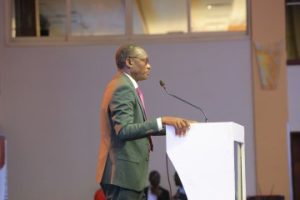
Celebrating 15 years of excellence, the FiRe Awards, organised by ICPAU in partnership with the Capital Markets Authority, Uganda Securities Exchange, and New Vision, continue to shape Uganda’s corporate governance landscape.
As Prof. Mushengyezi aptly concluded, “The future will belong to institutions that dare to evolve, that lead with clarity of purpose, and that invest not only in profits, but in people, values, and impact.”
